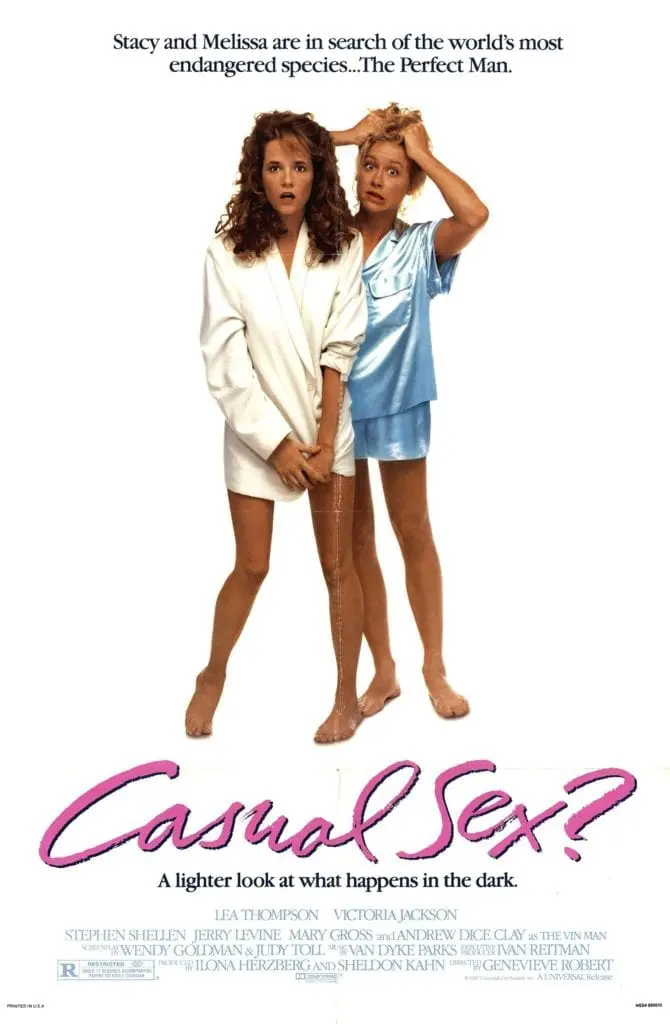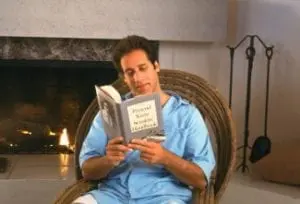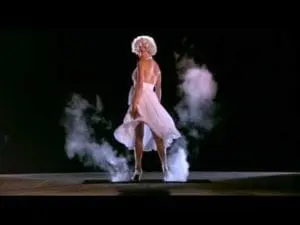Casual Sex?
"A lighter look at what happens in the dark."
(1988)
starring Lea Thompson and Victoria Jackson
PODCAST:
'80s Movies: A Guide to What's Wrong with Your Parents -
CASUAL SEX?
Interview with Screenwriter Wendy Goldman:
How a musical about female friendship became a Rom-Com where Andrew "Dice" Clay gets the girl
Best friends Stacy and Melissa book a stay at a singles health resort in hopes of finding some nice, disease-free men.
Why it’s rad:
Casual Sex? is the first studio feature film to acknowledge the fear of AIDS that was sweeping America in the late 1980s.
It's a sex comedy for women. Not only was this the rare unicorn that showed sex from the women's point of view, the crew was solidly female including the director, both screenwriters, the first assistant director, the steadicam operator, production designers, boom operator, and of course, there were two women as the leads. On the other hand, they only talk to each other about men, so it still doesn't pass the Bechdel test.
So '80s:
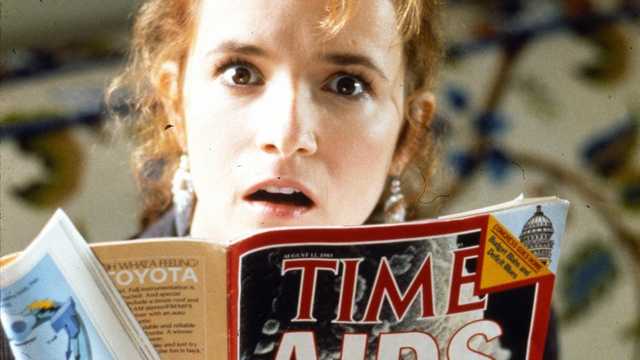
AIDS. In 1981, the first murmurs of AIDS emerged, but it was unclear how the disease was contracted and spread. it wasn't until the mid-'80s that a real alarm bell was raised in heterosexual communities as the mysterious deadly illness was affecting more than gay men. Around 1986, sexually active Americans started their retreat: the sexual revolution was over. Conservative groups were in charge of the government at that time and they banned use of federal funds for AIDS prevention and education for gay communities. The Center for Disease Control did receive funding to create a PSA campaign aimed at broader groups, including women, college students, and the parents of teens - these would be demographics who were at a very low risk to contract the autoimmune illness.
"Aerobicize." In the '80s, "aerobicize" was a word. Part dance, part calisthenics, group workout classes were all the rage.
Club Med knockoffs. The Oasis is a Club Med-like singles health spa resort. Yes, this was a thing. "The friendly atmosphere, free-flowing cocktails and sultry summer evenings made holiday romance easy to find, and Club Med began attracting hordes of singles in search of a good time," an article in France Today reports. "By the 1980s, Club Med’s all-inclusive model was firmly established but copycat resorts were springing up across the world."
The wardrobe. The Oasis spa staff's pink jacket and matching ties were pure Miami Vice and Vinnie's swim trunks are what comes up if you google "'80s graphics."
What’s your damage?
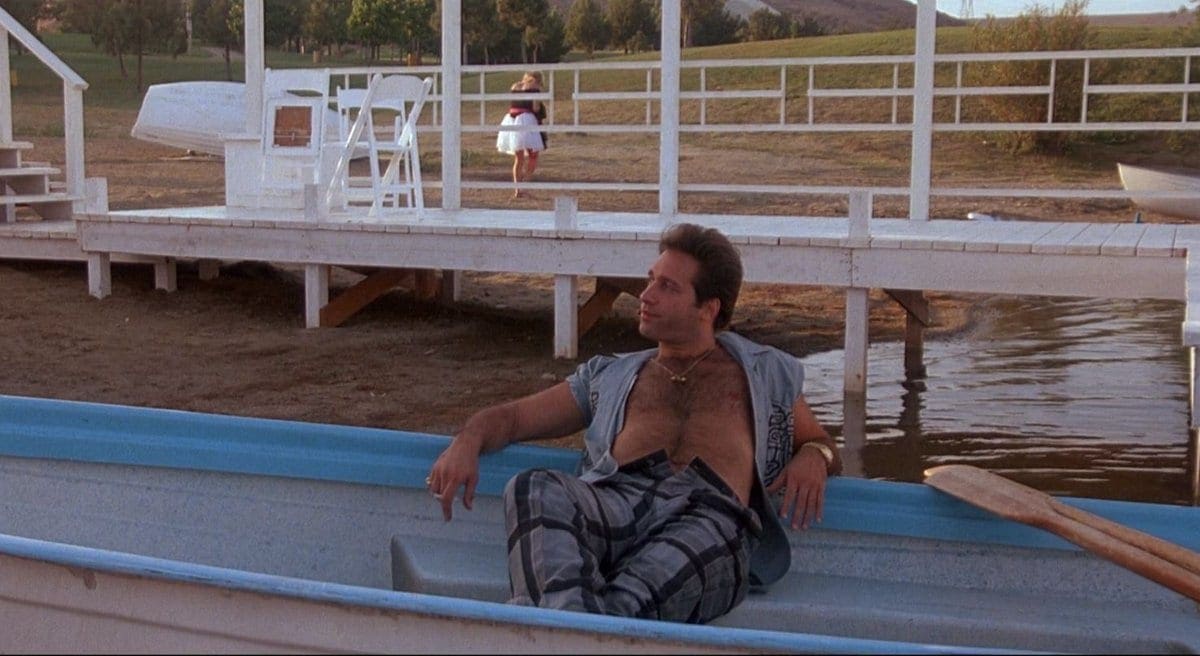
The pendulum had swung for women from socially acceptable promiscuity to shameful conservatism. Stacy has lived in the early '80s sexually open world in which hooking up was "a great way to meet people." Now in the late '80s, when confronted with the men she'd had sex with through the years, she is humiliated.
The film demonstrates the sexual games that emerged in a slut-shaming environment. It wasn't that women couldn't enjoy sex, but they would get "a bad reputation" if they succumbed to sexual desire. Therefore, a belief existed among some (even if it was not correct) that a woman SHOULD say no, but it was a man's role to persuade her otherwise. Melissa, who has only had one sex partner, is kissing a potential suitor. She says, "Stop." He says, "But you don't want to, do you?" Melissa doesn't respond and the man continues pulling off her tights and then she makes a comment that indicates she now likes what he's doing to her.
Melissa's best friend marries the man who sexually violated her. Was Melissa sober enough to consent to sex with Vinnie? While that's unclear, it is clear that Vinne took advantage of her obliteration and left her feeling sexually violated. The morning after, the Vin-Man smugly lights a cigarette while stroking his own ego about his conquest. On the other hand, Melissa is horrified at what happened and slinks away, spinning her into a personal crisis where she leaves the spa in a rush, desperate to get out of there at any cost
Behind the Scenes
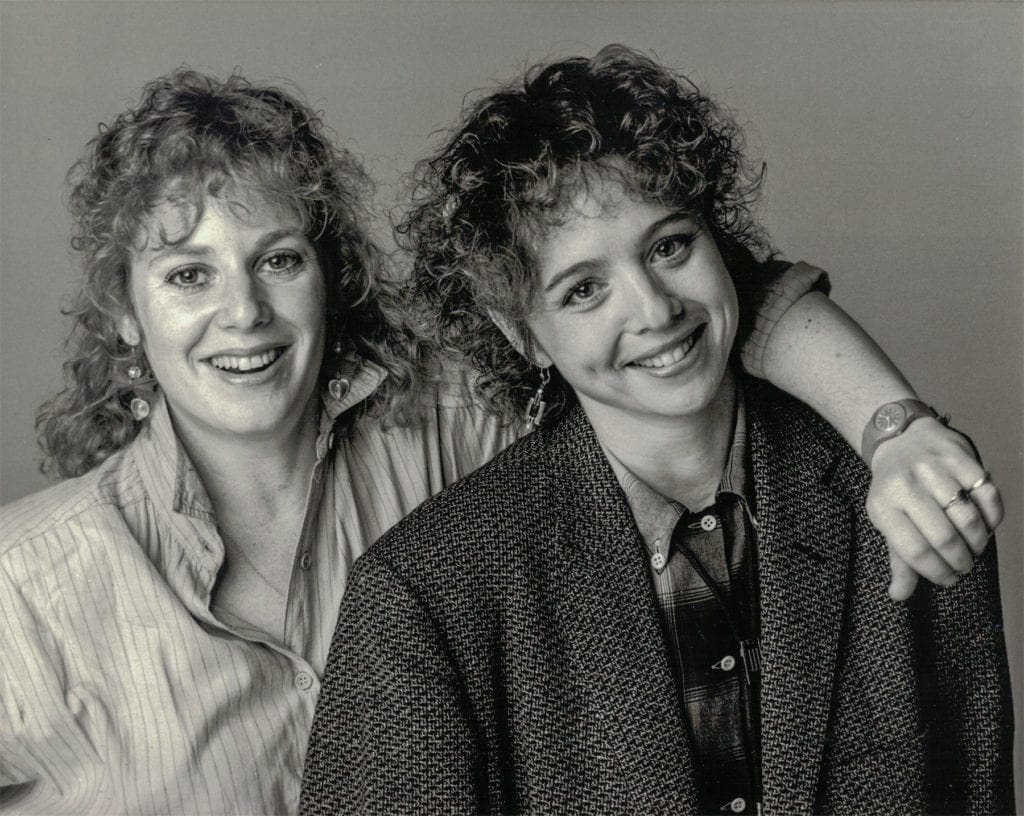
THE IDEA: WENDY GOLDMAN & JUDY TOLL
It all started as a sketch in a Groundlings show. Wendy Goldman and Judy Toll were members of LA's famous improv and sketch theater troupe, The Groundlings. In 1984, they created a three-song musical sketch embedded in an improv-sketch compilation production titled "Please Don't Eat The Groundlings."
The mini-musical won a competition to become a full-length production. The improv theater conducted a search for "alternate formats" which was intended to give unheard voices - like women - more opportunity. In our podcast (above), Goldman said she and Toll wanted to create a play that reflected their own real-life friendship. "It was really a very personal story to us about our friendship and we wanted to portray what our lives were like. We were both single and we were both questioning about dating, and who we would end up with and who we’d even spend 15 minutes with! That was what our sex life and what our romantic life was like then," Goldman said. "We also felt our voice was missing [in entertainment platforms] at the time: women talking to each other."
The angle of the play was much different. Titled "Casual Sex" (without the question mark), the play - or rather "musical fling" - took place at a Club Med-type singles vacation called 'Club Fun' and featured original songs like "Sensuous Dude," "'Cause We're Girls," "Someone for Everyone," and "I'm Only 33," "It's a relationship comedy," producer Mary Woods told the LA Times, "sort of a yuppie beach movie. Light and funny, but eventually ending up at ground one: even though society says we should be liberated and free and independent, and that casual sex is a necessary product of our times--all we really want is to be loved."
The play was only supposed to run for 8 weeks. It ran for 1 year. During that time, it won several LA theater awards and quite a bit of attention. "Our play got a really great review in the LA Times and that opened up a world of people beyond who normally went to Groundlings shows," Goldman said. It also got the attention of powerful producer Ivan Reitman.
Ivan Reitman was looking to produce a project for his wife to direct. Reitman was a walking green light. He had been the producer of Animal House and directed Stripes and Ghostbusters (words cannot explain what a phenom that film was). His wife, actress Genevieve Robert, had recently graduated from AFI and they were on the lookout for material she could use as her directorial debut. Reitman saw The LA Times review... and he knew Goldman.
Wendy Goldman was an actress on a couple of Ivan Reitman TV comedies. "I was on a TV series he had produced called "Delta House," which was based on the movie {Reitman produced] Animal House. I was also in a show called "The National Lampoon Show" that he was involved with. He already knew me as an actor," Goldman said. "So, he contacted me and said did I think the play could become a movie?"
Goldman and Toll were originally supposed to star in the film. Reitman and Robert attended the play and struck a deal with the women to turn it into a small, independent film so Robert could hone her directorial skills. Goldman and Toll would adapt for the big screen and star.
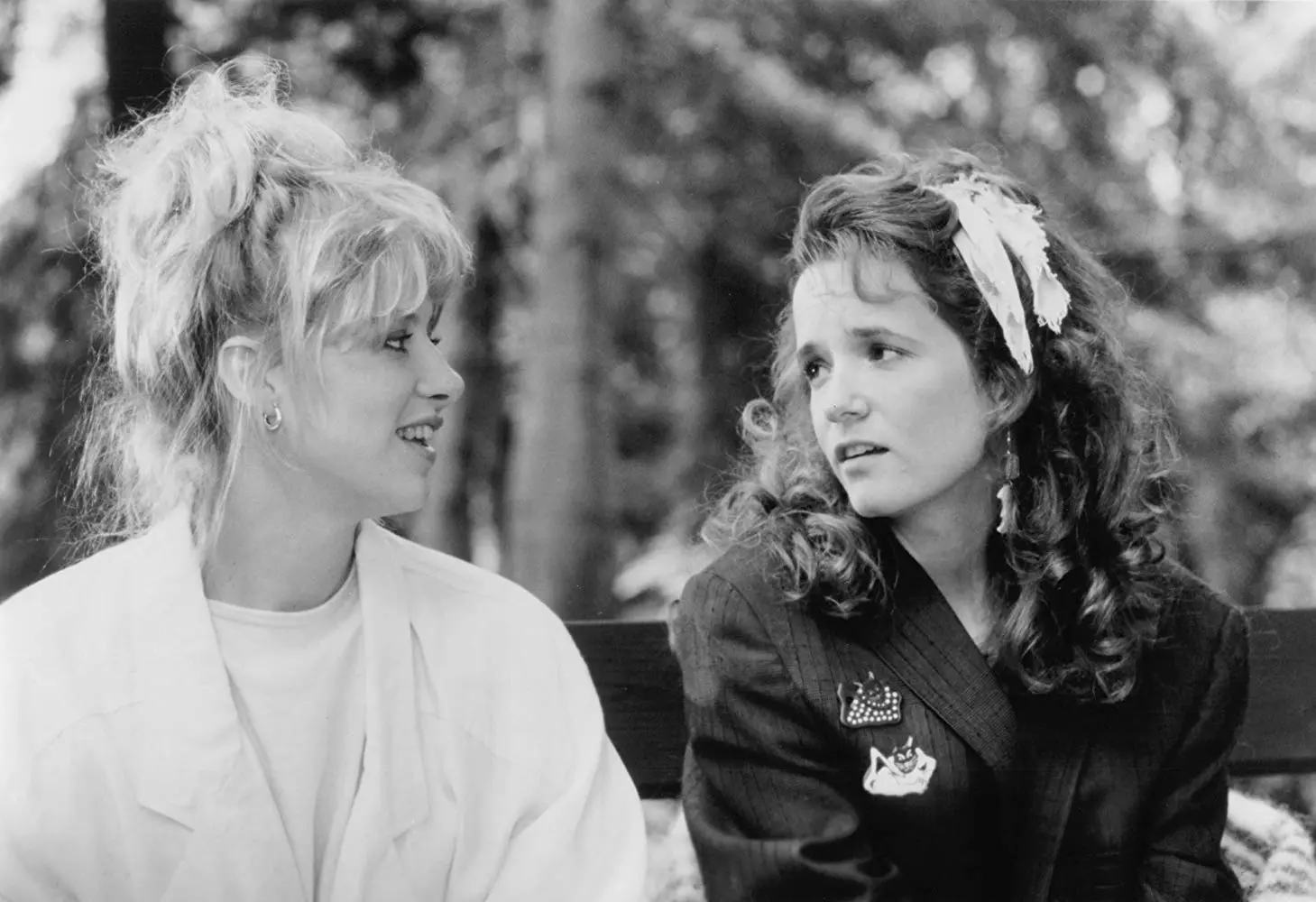
THE SCRIPT: SO MANY REWRITES.
The movie was originally a female buddy musical comedy. "When we were hired to do the movie, the movie itself actually started with the idea that it would be a musical. It was going to be a very light treatment of it, just like the play was a light treatment of it, but with the serious emotional stakes between the two women and their relationships," Goldman said. "For a very long time in our drafts, the focus of the movie remained – the ending of the movie anyway – ended with the friendship of the women."
Like the play, the film's original ending did not have the women finding love with a man but recommitting to their love as friends. "It was important to Judy and I that ultimately [it] would end so you’re thinking about their friendship. It was about what their friendship went through. They went off in two different directions," Goldman said. "The end of the play was their coming together again, not what their future with guys would be. It was more about how their friendship was tested. Through loving each other so much, we wanted them to end up together in a certain way. It wasn’t about ‘am I going to end up marrying this person?’ It was, look at these women, they went through what they went through, and their friendship was more important than all of this."
With a female director and two female writers, the novelty of the film was the female point of view on how sex was a necessary component of dating. "[Judy and I] would talk about what was good for us, how did this experience compare to that experience. It wasn’t like they were all thrilling and happy, which is what we wrote a lot about in the play and the move, " Goldman said. "There weren’t things we felt were holding us back [sexually] and it wasn’t a very judgmental time about that, as far as women were concerned. But, people weren’t writing about that. I didn’t see us reflected in the media we were experiencing, movies we were seeing, or plays or books that we were reading at the time. Judy and I were always talking about these things at length, so why shouldn’t we use pieces of our real life and questions we were asking ourselves and where would this lead? We were still pretty romantic people that coming out of this, we could meet a person."
Good news? Universal wants to make the film into a big studio feature. Everything changes. Originally, Reitman anticipated Casual Sex would be a small indie: his wife would direct, Goldman and Toll would write and reprise the characters they'd created and honed on stage. However, Goldman told '80s Movie Guide that Universal liked it, increased the budget, and wanted it to release it on a much wider scale. Toll and Goldman were given the opportunity to audition for their roles, however, the studio wanted star power to help market the film.
The AIDS scare and a question mark were added. The sketch was performed in 1984 and the play was performed in 1985, but by 1986, awareness of a scary new sexually transmitted virus was changing quickly the sexual revolution. Goldman told us that Universal realized it would be irresponsible and out of step with the times to produce the script as written. In the play, there was no mention of AIDS or safe sex or anything. "[HIV/AIDS] really wasn’t anything Judy and I or our friends at the time or people we hung out with at The Groundlings -- as heterosexual females at the time and in our dating life -- it wasn’t something we were concerned with," Goldman said. "I don’t remember how far in the writing process it was, Universal got concerned: ‘wait a minute, wait a minute, how can we make this movie right now?’ Because now the AIDS outbreak was something that was much more -- the concept more than the actuality -- spreading to the general population. That’s how the question mark ended up at the end of Casual Sex?...They even thought at one point we needed to change the name of it. There was a lot of nervousness around it.
While retaining its female point of view about how to approach sex and dating, the entire trajectory of the story was changed. Instead of it being about two single women navigating the expectation of casual sex in the dating world, it was now about two women who want an active sex life, but have to figure out how to first find a healthy partner. The musical was scrapped and now it starts with Stacy's visit to the doctor to get a clean bill of health and her year of abstinence. Thus, the question mark at the end of the title was added to project that the women were no longer so sure about engaging in casual sex.
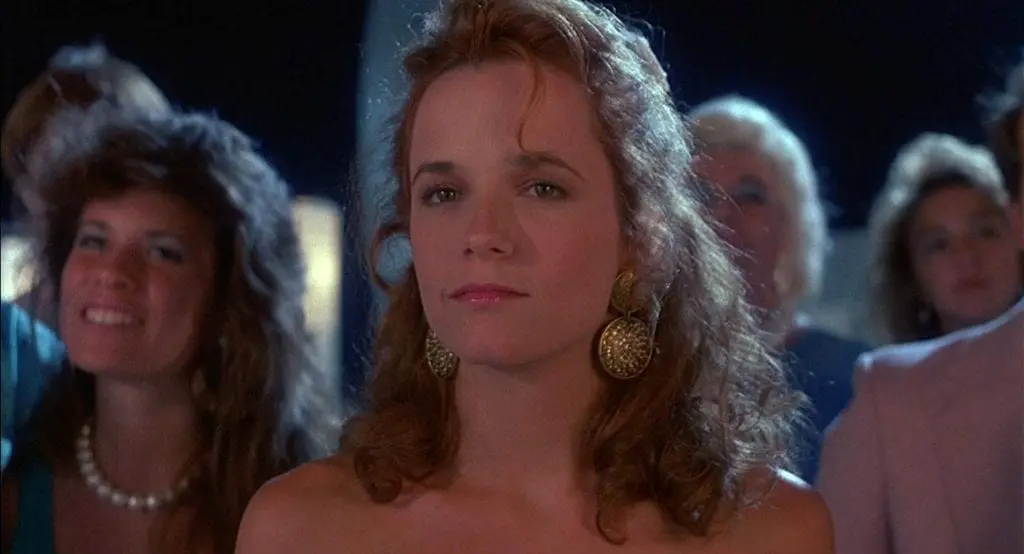
LEA THOMPSON
Casual Sex? allowed Lea Thompson to leave high school. The 26-year-old had been playing teens for her entire career and her previous role was in the John Hughes-Howard Deutch film Some Kind of Wonderful. Casual Sex? marked the end of being cast as a kid.
Thompson signed up to do a female friendship movie, not a rom-com. "It was very hard to find a friend movie, you know, like two women being friends at the time," Thompson said in our interview for HDNET Movie. "The women’s parts were always just like 'the pretty girl with the guy,' or whatever, but, the female friendship thing I thought was really interesting. But that movie was fascinating because we actually reshot half of that movie."
She was not happy with the revised ending. 'It was a completely different movie from the movie we shot. They tested it and that was really difficult for me because Andrew Dice Clay was in the movie...and he had this image," Thompson told us during HDNET Movies' Iconic '80s Week. "He was the buffoon in the first version of Casual Sex? and he ended up scoring so well, they ended up making me marry him. I was like, how did it go from buffoon to marrying him?
In the reshoots, they had Stacy get married to several men. "I think I married like four different guys and they were gonna cut it together," Thompson said about the abandoned idea.
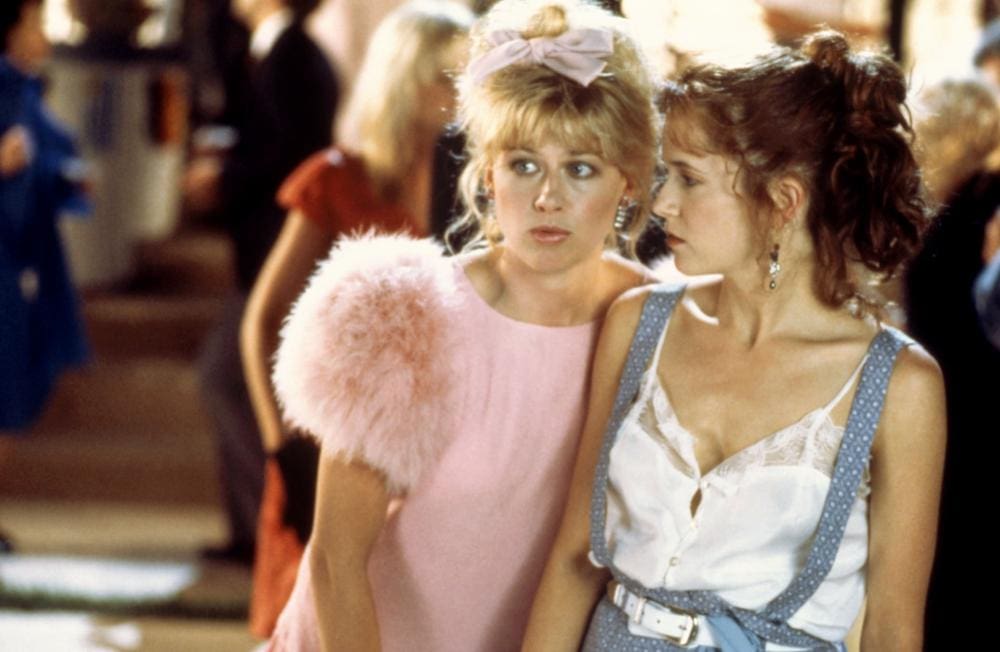
VICTORIA JACKSON
Victoria Jackson was hot on SNL favorite, known for ditzy characters. The 27-year-old comedienne was represented by Bernie Brillstein (as was most of the "Saturday Night Live" cast), who brought her the script and she related to the character of Melissa. "Whenever you see sex in a movie, it`s always glamorized, and this was so real," Jackson told The Chicago Tribune. "'She is insecure, and I related to that; I was a late developer. I was raised a Baptist, and I believe in the Bible, and I didn`t go through the `70s sleeping around. But no matter who or what you are, you`re going to have sex, and, initially, it`s going to be awkward.''
Jackson said the movie is about finding Mr. Right. Jackson told The Chicago Tribune that the movie was not about women looking to engage in wild times, but rather, women looking to settle down. "The fact is, the film is very subtly pro-monogamy, anti-casual sex.''
Despite her strong Baptist religious beliefs, Victoria Jackson had no qualms with the nudity. ''Christians have sex, and they love sex,'' said Jackson. ''It`s just that they don`t make fun of it; it`s a beautiful thing.
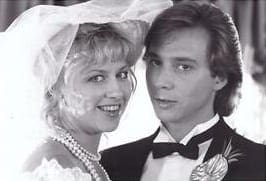
SUPPORTING CAST
Jerry Levine. Levine is most known for playing the wild partying, slick marketing, T-shirt wearing best friend Stiles from Teen Wolf (1985). So, he was cast against type to play sensitive man Jaime, the Oasis masseuse who is always sweet, always respectful, and always there for Melissa. "The sensitive man" was emerging in the late '80s as a counter to the hypermasculine, tough exterior action heroes like Sylvester Stallone, Arnold Schwarzenegger, and Charles Bronson. Goldman said that Jamie was definitely written to be this character, the kind of guy a girl wants to marry.
Mary Gross. Like Victoria Jackson, Mary Gross came from "Saturday Night Live," but they weren't in the same cast. Gross' SNL run concluded at the end of the successful 1984-5 Season 10 that included Billy Crystal, Julia Louis-Dreyfuss, Jim Belushi, Harry Shearer, Christopher Guest, and Martin Short. Lorne Michaels hired Jackson, a favorite of Johnny Carson, for Season 12. However, Gross and Jackson had just worked together in both the Diane Keaton comedy Baby Boom (1987) and the Dan Akyroyd-Charles Grodin comedy The Couch Trip (1988). Her character in Casual Sex?, Ilene, bonds with Stacy and Melissa on their health spa vacation.
Stephen Shellen. Stephen Shellen was a Canadian actor who had been moving up the Hollywood food chain with his shockingly blue eyes and dashing looks, cast in Jackie Collins mini-series "The Hollywood Wives" (1985), teen film Modern Girls (1986), and the Terry O'Quinn chiller The Stepfather (1987).
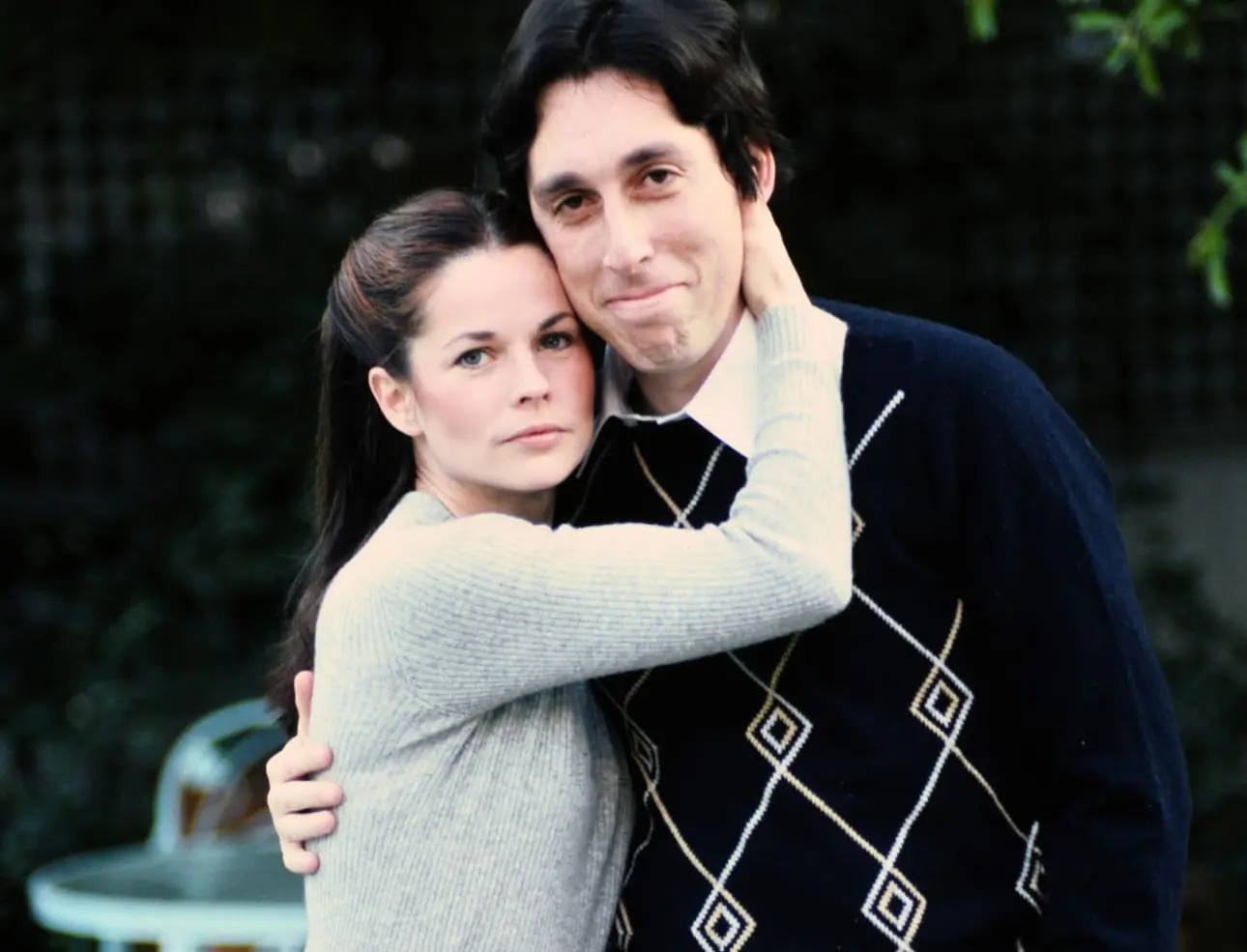
IVAN REITMAN & GENEVIEVE ROBERT
Ivan Reitman's career began making films about sex. Some called them porn. After making Canada's most successful student film ever, he followed it up with The Columbus of Sex, which was soft-core pornography. The vice squad showed up and confiscated the film and arrested Reitman. He was convicted of making and showing an "obscene film." He followed it up with movies about a venereal disease that drove the afflicted insane and a film starring porn star Marilyn Chambers. Then, of course, he produced Animal House, and his comically funny films that revolved around sex became the hot genre.
Reitman's wife making her first film about sex made sense, especially making it from the female experience. "This movie tackles AIDS, sexuality and friendship,” Geneviève Robert told People Magazine in April 1988. “For young women these days, sex now has all kinds of repercussions it didn’t have when I was single.”
Stacy and Vinnie's Home is the home of Mr. and Mrs. Reitman. With the reshoots, there wasn't a lot of time to secure locations. So, in that final scene where Mr. and Mrs. "Vin-Man" welcome Melissa and Jamie at their house for Christmas? That's the Reitman family home! And, that's not all the Reitmans shared...
Jason Reitman makes his film debut. Ivan Reitman is known to utilize his family for smaller parts and Robert did the same. Jason Reitman is one of the children dragging Vinnie down the stairs to greet Melissa and Jamie. "One of 'my' kids was Jason Reitman," Lea Thompson told us during HDNet Movies' Iconic '80s shoot. "So I’ve never been in his movie, but he played my son once!"
Robert's Frenchness was a plus. "It was so much fun working with [Robert] because she’s French, so she was just like mmm, everything is just kind of like delicious and beautiful," Thompson said. "And I wanted to be her, to be honest!
Ivan Reitman's boyish zeal finds its way into all his pictures, even the ones he produces instead of directs. Lea Thompson described the director and producer whose work shaped the '80s as "fun, kind, brilliant, cynical" and a "good person" who has "such a great sense of humor." She told us, "He’s got such a sense of delight about making film – you are excited to make him happy. And he seems to really enjoy what you’re doing."
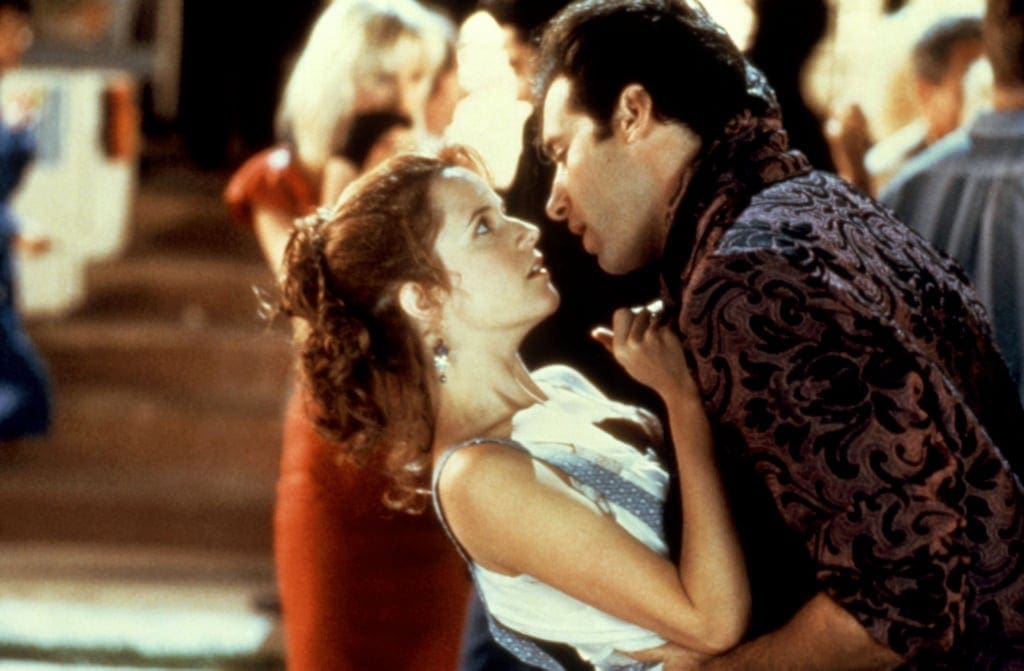
ANDREW DICE CLAY
Casual Sex? was the third film where The Diceman was a character. Andrew "Dice" Clay hadn't hit yet, but he had been playing the comedy circuits on The Sunset Strip through most of the '80s and, in fact, was famously living in the house behind The Comedy Store that was basically a stand-up comic frathouse. "The Diceman" shows up in two previous films, both starring Brat Packers. "What was crazy is I got two movies when I was younger that used my stage name, which I already had, in the film itself. One was called Making the Grade with Judd Nelson, and the other movie was Pretty in Pink. I was thinking, “If I go movie to movie, and there’s the Diceman, that’s never been done—with the same guy in different movies.” And then bring it to TV, like a sitcom—that was the initial plan. In Casual Sex? they called me the Vin-man rather than the Diceman. But it was the same guy."
Screenwriter Judy Toll recommended Clay for the role. Robert and Reitman wanted to cast comedians and were frequently comedy clubs to find talent for the film. Toll knew Clay from the early '80s before he'd hit and recommended him.
The casting of Dice is surprising since Casual Sex? probably had more women on the crew than all the movies made in the 1980s. Aside from being a film with two women as the leads and two female screenwriters, the crew was heavily female in jobs rare for women to get: Director, First A.D., Boom operator, Steadicam, Transportation captain, Production coordinator, Sound editor, ADR Editor, etc. So, how did a guy reviled for his derogatory humor against women get the part? Thompson told us Andrew Dice Clay was cast as a buffoon, someone the audience was laughing at. In the original script, Vinnie didn't get the girl, he got a comeuppance. He wasn't even in the end. And that was the problem.
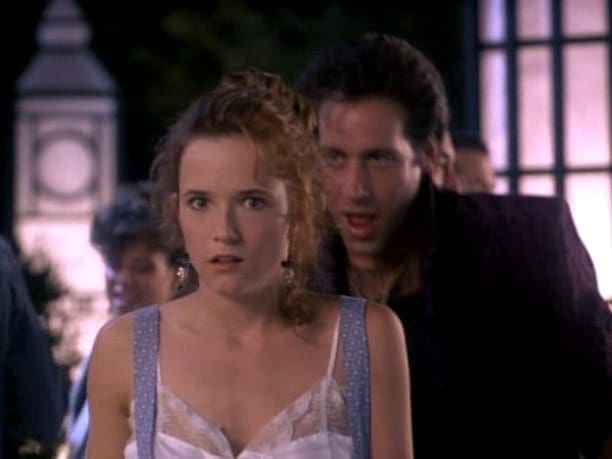
HOW DID A FEMALE BUDDY FILM TURN INTO A ROM-COM WHERE ANDREW DICE CLAY GETS THE GIRL?
Universal executives became concerned that men wouldn't go to the theater to see a comedy about women. Films usually are tested for audiences before release. Whether it was intentional or not, Goldman believes that the screening audience skewed male. Clay tested "really, really well," Goldman told us. "He was just someone they wanted to see more of, and wondered why isn’t he part of the ending (which he wasn’t). All of a sudden, it became write him: write what happens with him and Stacy, take this movie into the future."
So wait, then Stacy MARRIES Vinnie? The same guy who took advantage of her drunk best friend? Goldman said that it was "challenging" to write a new ending that would make sense to why Stacey would choose Vinnie, but they did. "It was not an easy mission and I think we had a lot of “how do we do this?'" Goldman said about the assignment.
Lea Thompson did not want to kiss Dice. "I liked him, but you know, I didn’t feel like kissing him," she told us. "The things he says were so offensive to me as a feminist, I just thought it was really weird.
Totally upending their "Friendship is True Love" ending was a surprise, having Stacy marry Vinnie was a shock, but for Goldman and Toll, getting their play made into a movie was the opportunity of a lifetime. "We had to stomach it," Wendy Goldman said. "It wasn’t our money...it’s not like we had leverage in this situation. [Ivan Reitman] was also teaching us how to write a movie. We’d never written a movie before! So, this was an education for us and an opportunity to have a writing career."
Andrew Dice Clay showed his acting chops by being able to convince the audience Mr. Wrong was really Mr. Right. "We had a lot of work to do to get his character palatable enough to us so we could feel okay with it," Goldman said, who admitted Clay's acting skills enabled him to make it convincing. "He was able to show a side of him I didn’t know he could do. But talk about taking a challenging person!"
The rewrite was "rough" but Thompson said the actors and crew pulled it off. "People liked [Dice]. He’s funny, and I’m so happy for his career right now," she said about his critically acclaimed work in Academy Award-nominated films A Star is Born and Blue Jasmine. And about that ending..."I think we made it work."
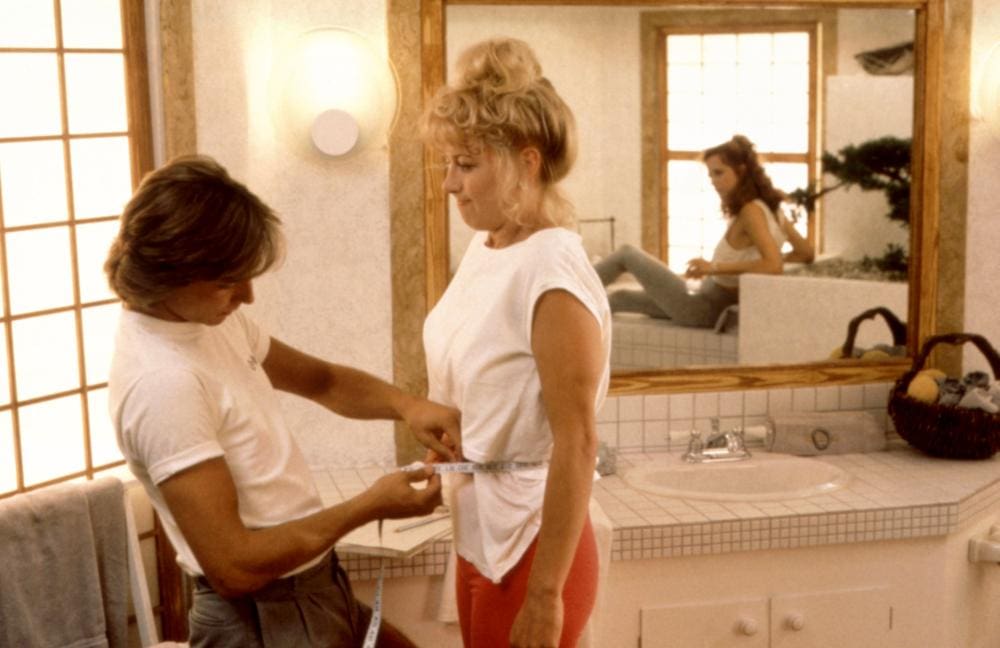
FUN FACTS
Victoria Jackson's chubby girl clothes aren't a reflection of her weight, they're a reflection of a woman's insecurities. Or maybe it's because she had a baby during production. As her bedroom scene indicates, Jackson wasn't overweight, she had an enviable figure. However, her character Melissa talks as if she is fat and wears baggy clothes. Wendy Goldman told us that when she wrote the script with Judy Toll, they wrote it to reflect their own insecurities - in the documentary made about Toll's life by her brother, they acknowledge that Toll was "obsessed with her weight." Maybe more importantly, Lea Thompson told us that somewhere in the shooting/reshooting schedule, she remembers Jackson had a baby and so her size had changed.
Judy Toll would go on to create a stand-up routine making fun of Andrew Dice Clay. Using the character name Andrea Dice Clay, Toll wore a black leather jacket with chains and mocked Clay, turning the tables on men. Essentially, she did his act but as a woman. Toll told The Chicago Tribune that Clay, with whom she was friends, came to see her spoof and he gave her suggestions for additional material. It eventually became a TV Special: "Judy Toll: The Dice Woman."
Lea Thompson hated Stacy's hairstyle. "I’m really not happy with my hair," Thompson told us. "That was my worst '80s hair. That, that was a lot of hair. " Considering the crimped 'do she sported for Howard the Duck, that's saying a lot!
Victoria Jackson and Andrew Dice Clay dated. AXS TV. and Whose Dating Who writes that the opposites were once an item in 1987 around the time the film was being made. Clay was newly divorced while filming Casual Sex?, and Jackson was a new mother although not yet divorced.
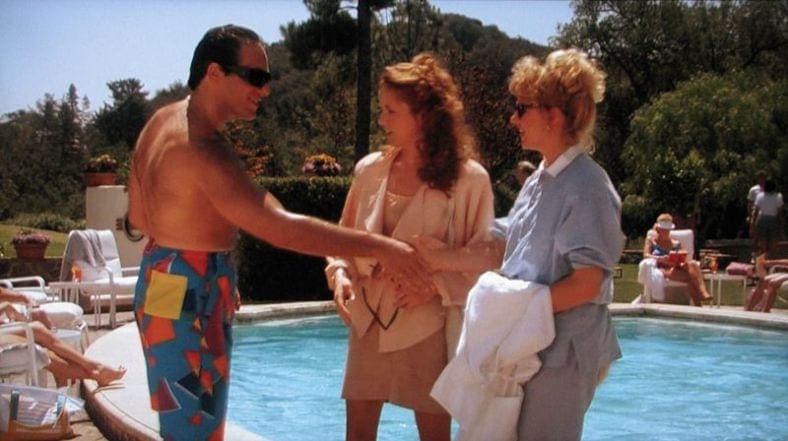
REVIEWS:
People Magazine could see through the rewrites. "Here’s an unusual film in this male-dominated industry: a movie for women, about women, made almost entirely by women. So do we get some fresh insight and humor about relationships in the AIDS era? Noooooo! We get the same sexism men have been guilty of for ages, in reverse. Every man in this movie, except one, is a moron, as if someone decided to hand a loaded gun to male chauvinists...Finally, it’s suggested that marriage will solve almost anything. But what are the filmmakers implying when Thompson marries the only man she isn’t attracted to? They don’t live happily ever after the way they used to, that’s for sure."
The Los Angeles Times wrote that "abstinence is more attractive." "If the script is dubious, the direction matches it. The cast is less directed than exploited. Lea Thompson crinkles constantly; Victoria Jackson does her whining bimbo bit; Andrew Dice Clay reprises his crass-macho stand-up comedy character; Mary Gross pops in and out like a guest hysteric, and Jerry Levine looks so much like Barry Manilow or Martin Short the three might consider a joint act: a New Age Three Stooges routine where they swat each other with mystic crystals. Meanwhile, the best answer if anyone asks you out for an evening of Casual Sex? is a vow of abstinence."
Variety was solidly meh. "With the late 1980s sensibility, their sex conversations are peppered with the girls’ finding their own identities in relationships with men outside the sex act. Is it mature? Yes. Is it funny? No."
The New York Times' Janet Maslin wrote "the film is as ordinary as it can be." "Casual Sex? proves not to be about promiscuity at all (the question mark is, of course, a dead giveaway, and it's mostly the use of words like ''orgasm'' that have earned the film its R rating). It's only about finding Mr. Right. Stacy wows everyone, Melissa strikes out, and eventually they both find happiness. Stacy is finally seen, years later, happily committed to someone with whom the film has never even shown her going to bed."
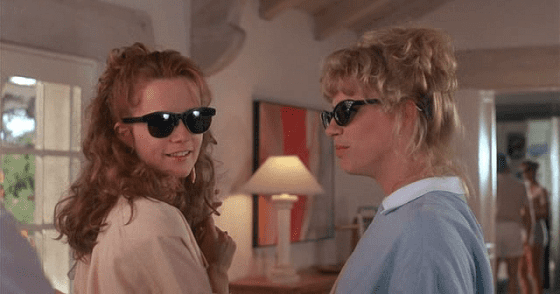
LEGACY
Andrew "Dice" Clay’s career blew up after Casual Sex? His act didn’t even “pretend to be sensitive.” He thrived off of making comedy that laughed at the mistreatment of women. In 1989, his debut comedy album "Dice" sold half a million copies. In 1990, he was the first comedian to sell out two consecutive nights at Madison Square Garden. He had a lapse of work while he tried to shed the "Dice" persona and he's received critical acclaim for his roles in Woody Allen's Blue Jasmine and playing the father of Ally (Lady Gaga) in A Star is Born.
Victoria Jackson sided with Andrew "Dice" Clay over her female co-stars. "SNL" cast member Nora Dunn publicly refused to be on the same episode as Clay, not wanting to contribute to elevating his career.Musical guest Sinead O'Connor joined in the walk off. However, Jackson said she would show up for work on Clay’s episode, that she didn’t believe it was her place to “discriminate against the host.” She told the LA Times that Nora Dunn "has a point" about some of Clay's jokes. But, she added, "he makes fun of everybody--gay people and black people and women--so how could you be offended? It's stupid to be offended." Jackson has become political and has embraced her position as a "Tea Party Princess." She currently has been working in projects coming out of the Christian filmmaking community.
Lea Thompson continued to work frequently but never had to play a high schooler again. While Thompson was one of '80s movies most iconic faces, she is also known for her '90s sitcom Caroline in the City, which ran for four seasons. While she still takes acting roles, Thompson is a busy director, specializing in TV comedies. She's also one of the '80s biggest, most accessible stars, taking time out to attend conventions so she can meet and interact with fans, face to face.
Judy Toll and Wendy Goldman did go on to a successful career writing comedy for women. Toll wrote episodes of "Sex and the City" (where she was a consultant), "Suddenly Susan" starring Brooke Shields and Kathy Griffin, "Alright Already" starring Carol Leifer and "The Geena Davis Show." Goldman rose to executive produce and write TV comedies including MTV's "Faking It," the ABC Family TV series adaptation of "10 Things I Hate About You," the Jenny McCarthy vehicle on UPN "Bad Girl's Guide" and the Patricia Heaton-Linda Lavin ABC sitcom "Room for Two." Goldman does do writing consultations at WendyGoldmanWriting.com. Judy Toll tragically died of cancer at the age of 44.
Geneviève Robert was one and done. After her experience on Casual Sex?, it appears Robert was content to leave directing to her husband, Ivan Reitman. She did return to her acting roots to play the Vice President's wife in Reitman's film Dave. Her son, Jason Reitman, has said she is the funniest Reitman.
Mary Gross' supporting role was part of her hot post-SNL film career. She went on to have roles in the Bette Midler-Lily Tomlin hit Big Business, a co-lead role in Feds, and played Shelley Long's assistant troop leader in Troop Beverly Hills. She chose to stop working in the last decade due to hearing loss.
Jerry Levine is thriving as a successful episodic TV director. After a role in "Boy Meets World" in 1997, Levine was offered the opportunity to direct five episodes. From there, he was off and running and is one of the busiest TV directors. Levine directed a full one-fourth of all the episodes of Everbody Hates Chris, which is about a young Chris Rock growing up in the 1980s.
Stephan Shellen had a great run in the '90s but lately has had tough times. Following Casual Sex?, Shellen had the role of his life: playing opposite Brad Pitt in the Robert Redford-directed '90s classic A River Runs Through It. He worked steadily in the '90s, eventually landing a series regular on the hit USA Network series La Femme Nikita. At the turn of the millennium, he did memorable work in video games. During the last decade, he has done several interviews stating that he's spent years living on the streets and appears to be suffering from paranoid delusions.
Soundtrack
Most of the music was already existing and licensed for use. Van Dyke Parks composed the score (he had been in charge of music for the animated film The Brave Little Toaster in which Judy Toll had a role and Club Paradise which co-starred Mary Gross).
"(She's A) Wild Card" by David Eric Lowen & Dan Navarro
"Night Visit" by Chaz Jankel
Director: Geneviève Robert
Screenwriter: Wendy Goldman, Judy Toll
Release Date: April 22, 1988
Rating: R
Opening Weekend Rank: #2. The #1 film was Beetlejuice. Other new releases
Opening Weekend Box Office: $3.8 million
Lifetime Gross: $12.8 million
Budget: unknown
Production Company: Jascat
Distributor: Universal Pictures



